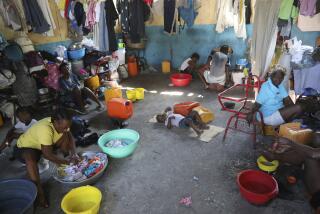Drought Leaves 30,000 Hondurans Hungry
EL HATO, Honduras — Drops of rain pelt into the dust, soaking into the dry earth in one of Central America’s hottest regions.
Maria de los Angeles Aguilar, matriarch of a family that includes her 13 children and 47 grandchildren, is heartened. “It’s the first rain of the year, which is good, since we had six months with no rain.”
A grandson, 8-year-old Manuel, passes by, showing signs of malnutrition.
“Before, in this place, the children grew very healthy,” his grandmother says. “Now, my children, grandchildren, are very malnourished. What will happen with the ones who come next?”
Almost four years after Hurricane Mitch caused widespread destruction in the region, Central America’s drought has at least 30,000 Hondurans suffering from hunger, the United Nations’ World Food Program says. A drop in world prices for coffee, Honduras’ biggest export, also is hurting the farm country, it says.
De los Angeles works long hours with her children on a melon farm to earn just 43 lempiras a day, less than $3. While they struggle to make enough to buy food, her home is surrounded by empty, dusty fields where corn used to grow.
Lorenzo Osorto is the only farmer who is working his land in this area near the Pacific Coast. “One must plant with the hope of rain. Without it, we have no harvest and the loss is greater,” he says.
Last year, the drought damaged 1.7 million acres of grain crops, which make up the bulk of Hondurans’ diet, and many areas are short of drinking water.
Resting in a hammock, 3-year-old Denis Vasquez is another child showing evidence of lack of food. His grandfather, Saturnino Lopez, worries about Denis and the other nine grandchildren living with him in his humble home.
“Many times we don’t have anything to eat,” he says. “None of them can attend the school, because we don’t have this to spend. If you ask the children what they ate today, they will say, ‘Nothing, with salt.’ ”
Aside from the drought, western Honduras is suffering from a 60% decline in coffee prices since 1999. The country’s 120,000 coffee producers lost an estimated $70 million last year, and an increasing number of people are leaving farm areas to seek work in cities.
Natividad Enamorando, a mother of five children, ages 2 to 9, says the going is hard.
“I haven’t been able to find employment in the last weeks, and it is very difficult to see so many days pass by that I don’t have anything to give the children to eat,” she says.
Three of her children attend school, where they get food donated by the World Food Program.
More to Read
Sign up for Essential California
The most important California stories and recommendations in your inbox every morning.
You may occasionally receive promotional content from the Los Angeles Times.










